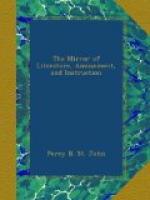Party rage ran so high in 1403, that an act of parliament was found necessary to declare, “Pulling out of eyes and cutting out of tongues to be felony.”—Dr. Rush, of Philadelphia, in his “Inquiry into the effects of spirituous liquors on the human body, and their influence on the happiness of society;” says, “Among the inhabitants of cities, spirits produce debts, disgrace, and bankruptcy. Among farmers, they produce idleness with its usual consequence, such as houses without windows, barns without roofs, gardens without enclosures, fields without fences, hogs without yokes, sheep without wool, meagre cattle, feeble horses, and half clad, dirty children, without principles, morals, or manners.”
P. T. W.
* * * * *
Shower of Sugar Plums—Charles XI., attended by his court, had been hunting in the neighbourhood of Carcassone. After the stag had been taken, a gentleman of the neighbourhood invited the king to a splendid dinner which he had prepared for him. At the conclusion of the banquet the ceiling of the hall suddenly opened, a thick cloud, descended and burst over their heads like a thunder storm, pouring forth a shower of sugar-plums instead of hail, which was succeeded by a gentle rain of rose-water.
The Coin Guinea—In the reign of king Charles II., when Sir Robert Holmes, of the Isle of Wight, brought gold-dust from the coast of Guinea, a guinea first received its name from that country.
A Motto.—A constant frequenter of city feasts, having grown enormously fat, it was proposed to write on his back, “Widened at the expense of the corporation of London."
Sedan-chairs and Hackney-coaches.—Sir S. Duncombe, predecessor to Duncombe Lord Feversham, and gentleman pensioner to King James and Charles I., introduced sedan-chairs into this country, anno 1634, when he procured a patent that vested in him and his heirs the sole right of carrying persons up and down in them for a certain sum. Sir Saunders had been a great traveller, and saw these chairs at Sedan, where they were first invented. It is remarkable that Capt. Bailey introduced the use of hackney-coaches in this year; a tolerable ride might then be obtained, in either of these vehicles for four pence.
Heroism—Seward, “the brave Earl of Northumberland,” feeling in his sickness that he drew near his end, quitted his bed and put on his armour, saying, “That it became not a man to die like a beast,” on which he died standing; an act as singular as it was heroic.
Epigram on Epigrams. What is an epigram? a dwarfish whole, Its body brevity, and wit its soul.
W. H. H.
* * * * *
“THE MOUSE TOWER”
A GERMAN LEGEND.
(For the Mirror.)
The bishop of Mentz was a wealthy prince,
Wealthy and proud was he;
He had all that was worth a wish on earth—
But he had not charitie!




